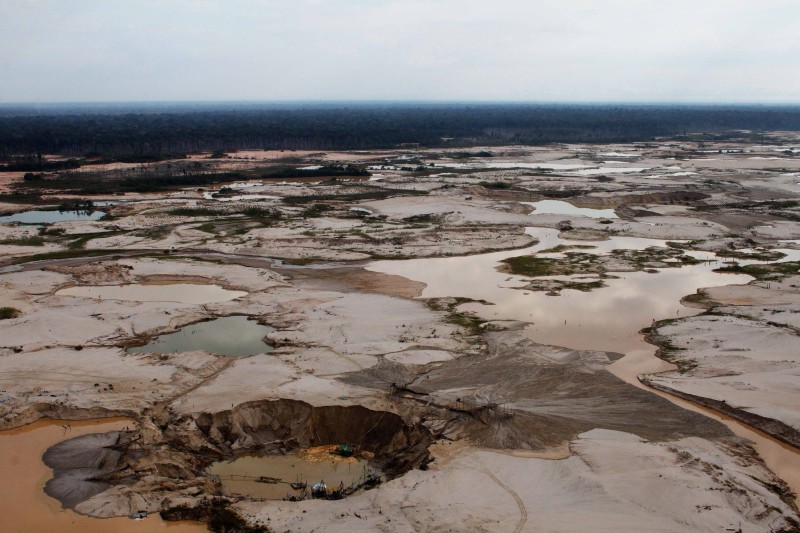Law enforcement agencies around the world are struggling to connect financial crime and corruption cases at home to the billions in illegal Amazon mining operations that fund them every year, an illicit finance and environmental crime expert told OCCRP.
While organized crime groups seamlessly fund their various enterprises from precious metals illegally sourced from the Amazon, police tend to compartmentalize their investigations to focus on one specific crime at a time, thereby failing to grasp the true scope of the conspiracy before them.
Julia Yansura, Program Director for Environmental Crime and Illicit Finance at the FACT Coalition, noted that from hundreds of environmental crime cases observed out of the Amazon, only one in three produced a parallel financial investigation from authorities.
“You'll typically find one government agency that investigates and prosecutes environmental crimes. A different agency works on illicit finance. A third agency investigates or prosecutes drug cases, and a fourth agency works on corruption,” she told OCCRP.
“The problem is, criminal networks have expanded and diversified their revenue streams. It's very common to find organized crime groups that are committing environmental crimes, trafficking drugs, bribing government officials, and laundering money. So a siloed government response is woefully inadequate.”
Environmental crime ranks amongst the fastest-growing illicit economies. As recently as three years ago, financial crime experts estimated that it was generating up to $281 billion in annual proceeds.
Illegal mining, primarily illegal gold mining, comprised the majority of environmental crime cases seen by the FACT Coalition out of the Amazon, dwarfing others enterprises like wildlife trafficking and the illegal timber trade.
Given gold’s global allure as a luxury, and versatile, commodity, criminals are careful to plan smuggling routes that are difficult to detect and trace by authorities.
“Many of the cases we analyzed involve government officials accepting bribes,” Yansura said. “Typically, the bribes will be to make illegally sourced products appear legal, for instance by creating a falsified permit or certification, or to facilitate their export to international markets.”
One case, known as the “Los Quilates” route by the Colombian Attorney General’s Office, saw corrupt officials facilitating gold trafficking out of the country. Couriers would hand off gold bars to customs officials at the Bogotá, Barranquilla, Bucaramanga and Palmira airports, who would then return the metal to the couriers after they had cleared security and were about to board their international flights.
Police ultimately arrested eight people linked to the conspiracy, and seized 60 billion Colombian pesos ($15 million) in gold, cash, and other assets.
Another conspiracy, dubbed the “Legend of El Dorado," exposed a multi-ton gold export and laundering conspiracy sourced from illegal mining operations. Over a ten-year period, the CIJ Gutiérrez International Trading Company allegedly trafficked 2.4 trillion Colombian pesos ($542 million) through a fictitious network of front companies and suppliers.
By falsifying sales each worth billions of pesos, the company could produce the paperwork needed to export the gold and simultaneously launder the proceeds.
The FACT Coalition’s report found that the U.S. is the most common destination for illegally-sourced natural resources, and for the dirty money associated with their sale.
“The U.S. has a big blind spot when it comes to dirty money,” Yansura told OCCRP. “We have major weaknesses here at home that we need to address.” Her views are supported by U.S. Treasury Secretary Janet L. Yellen, who has said that the best place to hide and launder ill-gotten gains is the U.S.
One explanation suggested by FBI Deputy Assistant Director Regina Thompson is that there are simply too many ways for criminals to launder their gold in the marketplace. Forged documentation, bribery, front companies, dishonest brokers, and exploiting corrupt officials are but a few ways for illegally sourced gold to appear legitimate once it’s entered the U.S., often thanks to “often-witting U.S. businesses” working for transnational crime organizations.
She also noted how Amazon mining operations, which “exist in remote areas with minimal government presence” permit “criminal activity and human rights abuses—including those involving forced labor, sex trafficking, child labor, and violence against native communities—to thrive.”
Amongst the suggestions listed in the FACT Coalition report include improved cooperation between source, transit, and destination countries affected by these crimes. Of the more than 200 cases examined, only 25 percent had any mention of multiple countries involved in the investigation.
Also highlighted was a need to better root out shell and front companies that mask criminal money laundering operations. This includes identifying beneficial owners as well as promoting an increased focus on corporate transparency for international affairs.
Experts say that the recent passage of the U.S. Corporate Transparency Act will go a long way in preventing misuse of corporate entities for criminal gain, be it money laundering, subverting domestic trade regulations, or fraud.
“The old ways of leading investigations aren’t working. Authorities tend to focus on the immediate commodity involved and stop there. If it's a gold trafficking case, authorities seize the gold and arrest the people immediately associated with it, and that's it,” Yansura said.
“Only recently there has been more of an emphasis on following the money and tracing it back to those with real power and influence in the criminal network.”






